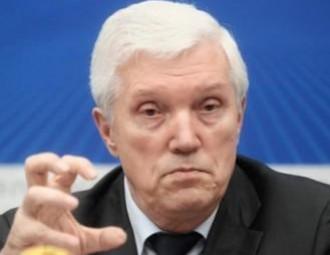Alexander Surikov: Russia is not worried about Belarus’ attempts to mend fences with EU

Russian Ambassador to Belarus discussed Russian business interest in Belarus, Russia-EU relations and economic appeal of the Eastern Partnership.
Russia and Belarus cooperate like no other countries in the world do. The turnout is growing rapidly and we are partners in the foreign policy, colleagues – in the military sphere and so on. We are even building our own special democracy, Russian Ambassador to Belarus Alexander Surikov said, reports Euroradio.fm. “Russian and Belarusian history and culture date back to many years ago. And we have to take it into account while building up the civil society and in the process of the country’s democratization”, - claims Alexander Surikov.
Probably, that is why Minsk and Moscow have the same opinion about the attitude of the international community to these “democratization” processes, Russian Ambassador is sure. “We think that Europe demands too much. Release political prisoners! According to the law, there are no political prisoners in the country. They committed crimes. How can you release them?! Who are political prisoners?! Do we have to admit that the Constitution and the law were violated? Does the government need to lose its face? It cannot happen!”
However, the similarity of attitude does not mean that Moscow will help the official Minsk in everything connected with dealing with political opponents. Russia is planning a selective policy in crediting Belarusian enterprises for modernization.
“’Give us money for modernization!’ What if we allocate money to modernize a Belarusian clothing factory and it will become more competitive than the Russian ones? Why allocate money to create competitors?!” –Alexander Surikov wonders.
In case the enterprise becomes “a Belarus-Russia business project” after the modernization, the Kremlin may find money for it. The Russian Ambassador mentioned the necessity of merging MAZ and KAMAZ again. “I can only regret we didn’t do it earlier (merged MAZ and KAMAZ into a holding – Euroradio). China left us a bit behind last year (in the truck market – Euroradio).”
The merger of Grodno-Azot and Russian Evrohim is also being discussed, Surikov noted. Work groups deciding the fate of Integral and Peleng have been created. Russian Electronics and Roskosmos are interested in them and KAMAZ would not mind “merging” Minsk Wheel-Tyre Tractor Plant too.
The Russian Ambassador did not answer whether Russian military men had chosen a place for their airbase. He said that he did not know. However, there are numerous suitable airdromes in our country left after the liquidation of the Belarusian Military Neighbourhood.
According toBelaPAN, Ambassador Surikov claims that “Russia is not alarmed by Belarus’ attempts to repair its relations with the European Union”. “Belarus is a European country, and its relations with neighbours cannot stay the way they are now.”
At the same time, the EU requires too much of Belarus by demanding a moratorium on the death penalty, Aleksandr Surikov said. The EU demands it despite the fact that a majority of the Belarusians voted in favour of capital punishment in a 1996 referendum, Mr. Surikov said.
However, both Europe and Belarus realize that it is necessary to go from demands to talks, he said. They have not yet started a dialogue, but they have begun preparations for it, he said.
Mr. Surikov stressed that Russia does not feel any “jealousy” but would be alarmed if such a dialogue drove a wedge between itself and Belarus. However, both European and Belarusian politicians understand that relations with the EU and cooperation with Russia should not be viewed as mutually exclusive, he said.
Mr. Surikov welcomed that he called a change in the behaviour of the Belarusian foreign ministry. It is good that its representatives meet with Minsk-based Western diplomats more frequently, he said.
The Ambassador also commented on the Eastern Partnership, saying that it has little economic appeal, reports BelTA.
“I view it as not more than a tempting label since it has no real economic projects,” the Ambassador said. In his words, the financial side of the project is about €600 million. The Eurasian economic integration looks much more profitable as it envisages much bigger sums, the Ambassador believes. Alexander Surikov reminded the reporters that the economic integration of the Troika means all its participants will have the energy prices at the level of the Russian domestic prices. There are also advantages in transport and other tariffs. The diplomat noted that huge transit volumes go through Belarus and Russia, that means rapprochement and cooperation would continue between the EU and the Russian Federation.
-
03.01
-
07.10
-
22.09
-
17.08
-
12.08
-
30.09








































